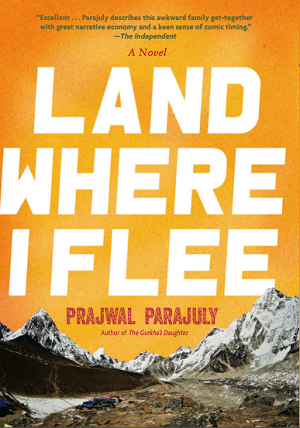 Land Where I Flee by Prajwal Parajuly is a novel about home and family. It’s a story about a Nepali-Indian family from the state of Sikkim in Northeastern India who have fled their home for a number of reasons, only now returning to see how things have changed.
Land Where I Flee by Prajwal Parajuly is a novel about home and family. It’s a story about a Nepali-Indian family from the state of Sikkim in Northeastern India who have fled their home for a number of reasons, only now returning to see how things have changed.
It’s a story about an 84-year-old grandmother, Chitralekha, who has raised her grandchildren after their parents’ death. But she’s no ordinary grandmother: she’s a beedi-smoking, innuendo-loving, crass, melodramatic and more than a little fraudulent businesswoman/grandmother with factories running and politicians eating out of her hand. She’s the most fun character I have read in a long time.
This book is also a story about four adult grandchildren who have come to their homeland from America and England to celebrate their grandmother’s birthday. Their reasons for having left are different as night and day, but they are motivated by something akin to the call of the motherland and familial duty.
For one of them at least, writing a book and salvaging a career is the goal. For others, the motivation ranges from a need for forgiveness, a desire to build bridges, even an escape from a toiling life.
They all have complications in their adopted homes, and we see glimpses of their lives in the west like snatches from behind a curtain. Still, leaving all their first-world worries behind, they have come back to their childhood home in an effort to please their old grandmother. That doesn’t mean they play nice with each other.
Most of all, Land Where I Flee is the story of Prasanti, a eunuch servant who lives in the house as if she owns it. Crass, loud, bold … she is like a prickly hedgehog whose thorns hide something softer and more complicated. Slowly, as the grandchildren settle into their familiar bedrooms, as the bickering between siblings rises once more, Prasanti’s wildly interesting and very sad story unfolds.
In front of this amazingly complex character, all the others seem lackluster and one-dimensional. They are the foil to her ugly yet hilarious language, her explicit yet shy moves, her obvious tenderness and fierce protection for her mistress. The grandmother and the eunuch are kindred spirits, almost, and the grandchildren are the backdrop for their interactions.
Watch Parajuly speaking at the Asian American Writers Workshop with Muna Gurung about South Asian stereotypes and tropes, including those about grandmothers, and his thoughts on developing the characters of Chitralekha and Prasanti.
Parajuly offers many points to ponder in his novel, sometimes nonchalantly, and at other times slightly more heavy handedly than I would have preferred. He tells the tale of immigrants who leave their land full of hope and dreams, only to find that the grass isn’t always greener on the other side. He tells the stories of those left behind, like villagers who envy their relatives gone abroad, like grandmothers who wait without showing their heartache. He makes a social commentary on class divisions and societal expectations, as when a Brahmin marries an untouchable, or when a priest’s daughter becomes a eunuch.
The picture painted by Parajuly is of a waiting countryside, a fractured nation, a city of endless stairs and endlessly patient people.
* * *
Read an excerpt from Prajwal Parajuly’s Land Where I Flee on The Aerogram, and find the author on Facebook.
Saadia Faruqi is the author of Brick Walls: Tales of Hope & Courage from Pakistan. Visit her website or follow her on Twitter @saadiafaruqi.












